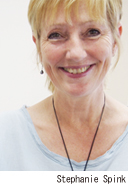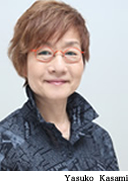Feldenkrais Professional Training Program
|
Links | About Us | Contact Us | Japanese Site |
FPTPThe Feldenkrais
|
The Feldenkrais Method is a unique and sophisticated approach to understanding human function, development and learning. It offers a framework in which to explore the nature of what it means to be human and how we can live in a more satisfying way. The Method utilizes the inherent wisdom and potential of our nervous system for growth, plasticity and ongoing maturation.The Feldenkrais Method® is beguilingly simple and versatile in application; to suit specific needs it is taught in two formats: Awareness Through Movement® group classes and hands-on individual Functional Integration® lessons. In Awareness Through Movement® lessons, students are verbally guided through a sequence of movement variations, drawn from the possibilities and range of human action. Using strategies for evoking learning, a student’s attention is guided to; how they move, how they use their attention, how and what they perceive. Through exploring this process students discover more efficient and effective ways of acting and using themselves. (drawing attention to how they move and using aencouraging them to use their attention, perception and imagination to discover more efficient and effective ways of acting and using themselves. )
In Functional Integration® lessons, a Feldenkrais practitioner works with a student on a one to one basis. The practitioner identifies the student’s needs, then guides the student with their hands (and other means), through a lesson, specifically designed in response to the students individual needs. Students become aware of their habitual ways of thinking, moving, sensing and feeling. As learning occurs, their self image is reorganized spontaneously. This is reflected in how they move and behave, which can then be integrated into everyday life.
Sharing the same conceptual basis both approaches use the nervous system's ability to self-organize towards more effective and able action. The Feldenkrais Method evokes and makes accessible each student's inherent intelligence and potential.
A Feldenkrais training is an exciting and challenging learning experience, which offers tremendous potential for personal growth and professional development. The human capacity for learning is unequalled. However when encountering novel or challenging situations our previously learned habits and/or habits of learning can work for us or against us. Not knowing how we learn or how we do something means we have limited ability to change that which we are less than satisfied with. When it is necessary or desirable to adapt to change the Feldenkrais Method provides a means to know how we are using ourselves (and through that know how others are using themselves). With this understanding and knowledge the means to know what to learn and how to learn it provide us with more skills and adaptability for life. By knowing how to access our nervous systems self organizing processes and capacities – we can learn to transform and refine our behaviors’ and everyday actions. Learning about and understanding our ability to attend, and our capacities for movement, enables us to perform our intentions with more efficiency and greater choice. The goal of the Tokyo 4 Training will be to introduce students to the deeply satisfying process of “learning how to learn”. Participants undergo extensive practical training in both aspects of the method and will be guided toward the necessary skills to be practitioners of the Method. Through detailed exploration and immersion in Awareness Through Movement® and Functional Integration®, participants will deepen their understanding and improve the quality, efficiency and effectiveness of their organization and actions. Whilst exploring their own ways of moving, thinking, feeling and acting, students will begin to evoke and facilitate learning in others. As well as learning experientially trainees will develop a cognitive understanding of the method and how it relates to other relevant fields of experience and inquiry. Students will explore the neurological, biological and psychological aspects of the Feldenkrais Method. Through these means the students will gain the knowledge and skills necessary to become practitioners. The Tokyo 4 Feldenkrais Training is passionately committed to developing each student’s innate capacity for learning. The training will enhance the student’s conceptual and experiential, verbal and non verbal understanding of the Feldenkrais Method, learning for themselves and others.
To facilitate learning the many different aspects of the Feldenkrais Method, course content will be explored in many and varied ways, intentionally supporting or challenging each students unique learning style. The training will develop a safe, lively, non competitive and supportive environment in which to learn. Students will be encouraged to be respectful, open and collegial. It is assumed that students will progress at different rates. Students will participate in individual activities, group exercises, problem solving activities, lectures and home assignments. Students will expand and deepen their experiences and understanding of all aspects of the Feldenkrais Method throughout the training by:
Benefits of participating in a Feldenkrais training are numerous and often surprising. Along with the development of professional skills an individual’s posture, breathing, flexibility and coordination improve. There can be emotional, intellectual and interpersonal development. Students develop increased curiosity, creativity and vitality. One’s self awareness is enhanced, self esteem and self expression also change. An improved sense of well being develops, and the capacity for future learning and self direction/agency emerge. Individuals who perform in areas such as sport, dance and music find their skills developing. For professionals, including health professionals, the Method offers enhancement for an existing career or entry into and development of a new and exciting career.
Commencing in September 2018, the Tokyo 4 FPTP will consist of 12 segments. These segments will be between 2 and 3 weeks long. There will be an option for a further 2 - post graduate segments, of 5 days each, to further refine skills in both ATM and FI.
The Feldenkrais Method | The process of the Training | What to Expect
|

